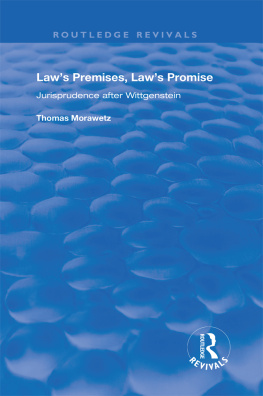Routledge Revivals
Categorization and the Moral Order
First published in 1984, this is a study of categorization practices: how people categorize each other and their actions; how they describe, infer, and judge. The book presents a sociological analysis and description of practical activities and makes a cogent contribution to the study of how the moral order actually works in practical communicative contexts. Among the issues dealt with are: collectivity categorizations, the organization of lists and descriptions, moral attribution and inferences, and the relationship between standards of morality and standards of rationality.
First published in 1984
by Routledge & Kegan Paul plc
This edition first published in 2014 by Routledge
2 Park Square, Milton Park, Abingdon, Oxon, OX14 4RN
and by Routledge
711 Third Avenue, New York, NY 10017
Routledge is an imprint of the Taylor & Francis Group, an informa business
1984 Lena Jayyusi
The right of Lena Jayyusi to be identified as author of this work has been asserted by her in accordance with sections 77 and 78 of the Copyright, Designs and Patents Act 1988.
All rights reserved. N o part of this book may be reprinted or reproduced or utilised in any form or by any electronic, mechanical, or other means, now known or hereafter invented, including photocopying and recording, or in any information storage or retrieval system, without permission in writing from the publishers.
Publishers Note
The publisher has gone to great lengths to ensure the quality of this reprint but points out that some imperfections in the original copies may be apparent.
Disclaimer
The publisher has made every effort to trace copyright holders and welcomes correspondence from those they have been unable to contact.
ISBN 13: 978-1-138-01432-9 (hbk)
ISBN 13: 978-1-315-79470-9 (ebk)
Additional materials are available on the companion website at
http://www.routledge.com/books/series/Routledge_Revivals
First published in 1984
by Routledge & Kegan Paul plc
9 Park Street, Boston, Mass 02108, USA
14 Leicester Square, London WC2H 7PH
464 St Kilda Road, Melbourne,
Victoria 3004, Australia and
Broadway House, Newtown Road,
Henley-on-Thames, Oxon RG9 1EN, England
Printed in Great Britain by
Billing & Sons Ltd, Worcester
Lena Jayyusi 1984
No part of this book may be reproduced in
any form without permission from the publisher,
except for the quotation of brief passages
in criticism
Library of Congress Cataloging in Publication Data
Jayyusi, Lena.
Categorization and the moral order.
(The International library of phenomenology and moral sciences)
Includes bibliographical references and index.
1. Social ethics. 2. Social interaction. 3. Categorization (Psychology) 4. Analysis (Philosophy)
I. Title. II. Series.
HM216.J39 1984 302 84-3448
British Library CIP data also available
ISBN 0-7100-9720-4
To Mother, Father,
and Jeff
CONTENTS
I wish to thank the Social Science Research Council for making available funds which enabled me to pursue portions of this work and Dr J.M. Atkinson, who headed the project (Community Reactions to Deviance), for giving me my first research opportunity, supporting my work and making data accessible.
I also wish to thank the Manchester and Salford Probation Service for providing materials from the course of their work for my research. I particularly wish to thank those members of the Salford an,d Manchester local offices who personally took the time to gather the materials for me.
Thanks are also due to Dr Paul Drew for having made the transcripts of the Scarman Tribunal available to me.
Two persons were particularly significant for my intellectual development and work in the years that I was studying at Manchester: Dr Wes Sharrock and Dr John Lee. Each of them was a source of inspiration, guidance and encouragement; each transmitted a great respect for analytic rigour and an appreciation for detail that remain with me to this day. At the same time, both were fine friends and colleagues. John worked hard to help me gain access to the Probation Service and gave me much support at times when I needed it. For both John and Wes, I feel more appreciation than I can possibly express in a brief acknowledgment.
For his warm collegiality and confidence in my work I owe special thanks to my friend Dr Rod Watson.
On this side of the Atlantic, I wish to thank Earl Taylor of Harvard University for reading and commenting helpfully on a section of this work.
My deep thanks to the many friends here and to my sister May, who, despite the hard times we collectively faced on other fronts, nevertheless gave me constant support, help and encouragement during this last year of writing. Without that I might never have finished.
To my dear parents I owe a lifetime of support and guidance; both have been deeply inspiring for their critical spirit, my father for the intellectual curiosity he tried to instil in me, my mother for her irrepressible creativity and determination. To my mother, too, go special thanks for always finding material ways of helping me accomplish this work.
My husband Jeff Coulter could not have been more wonderful in the depth and measure of his support and in the genuine intellectual inspiration he provided me. He has been a fine friend and colleague: a steadfast source of argument, questioning and insightful comment and, in his own work, a challenging example of rigour and dedication. On a personal level he sacrificed a lot of his time and overrode his own inclination to work during months in which he shielded me from every mundane concern. With constant good humour and love he helped me towards conclusion. Without him, this book would not have been finished.
Boston, USA
My underlying concern in this work is with the sociological analysis and description of members practical activities and their practical interaction. Such a project systematically encounters a set of problematics:
A Analytically: What is the phenomenon? How does one conceptualize, locate and individuate practical activities and courses of practical interaction? What specific sort of activities can provide a focus for the understanding of other sorts of activities? What further issues, questions, findings about the social order does any particular analysis open up? That is to say, what horizon of significance can one uncover?
B Methodologically: How does one locate and individuate the phenomenon how is access to it achieved? By what steps can analysis proceed? What counts as a warrantable analytic inference?
It is not that the methodological and analytic problematics are discrete as traditional sociological work sets them up, so that methodology is reduced purely to the problem of methods for data collection (interview schedules, participant observation , etc.). Methodology has to do with the logical status and methods of analytic inference. Clearly, then, this is already a constituent of the analytic problem and rests on some solution to the initial analytic questions appropriate to any domain. In other words, the latter problematic is a species of the former they are intricately embedded one in the other. The strategy for (B) hinges on some understanding and development of (A).









